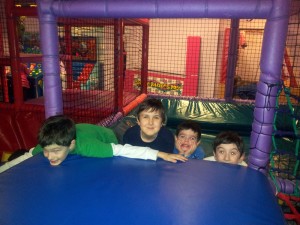From the first moment a child is diagnosed with autism, parents find themselves catapulted into a chaotic world of therapies, alternative treatments, and doctor appointments. We are left to fend for ourselves as snake oil salesmen try to take advantage, book authors offer conflicting points of view, and everyone from the family physician to Great Aunt Hilda offer their opinions on our children and our parenting. Sometimes these opinions are informed, and many times they are not. We often exhaust ourselves running through what feels like a rat maze, in search of answers or at least some advice that actually helps. We develop our own opinions, fend off curious strangers in the grocery store, and probably find ourselves engaged, on several occasions, in World War III via internet message boards.
All of this happens because we don’t have definitive proof of anything. What causes autism? What is the best method of treatment? Which therapies work, and which ones are a waste of time and money? What path do we take when there are so many options, none of which have a clear end point? All of these questions remain a mystery. As scientists work to unravel the causes and possible treatments for autism, we parents are scrambling to find our own answers. There is this sense of fear pervading every choice we make: Am I doing enough? Is this the right choice? Is this even working? What if I don’t do it, and I find out later this is the best treatment? What if I miss a crucial window of development?
This may be the most difficult part of raising our children. The fact that we don’t have a clear course of action laid out for us means we are often confused, overwhelmed, and fearful of doing the wrong thing or not enough of the right thing.
On the other hand, it can be a blessing in disguise. It’s a bit like taking a trip without a roadmap. Yes, it can be stressful and we may feel lost at times. But we also end up exploring down side roads we may never have noticed otherwise. We see and experience things off the beaten path, and make discoveries of our own. Along the way we find what works for our children and adopt those strategies. Through trial and error, we also learn what does not work, and we are free to discard those treatments and move on.
In the world of raising children with autism, no two paths are alike. For my family, I found that enrolling my sons in an intensive, autism-only preschool had a huge impact on their development. They learned, from professionals specifically trained in autism interventions, how to communicate well enough to convey their basic needs. They learned how to sit still (mostly), pay attention, and work independently when required. All of these skills served them well when they were later mainstreamed into regular elementary school classrooms. Now that they are capable of mainstreaming in their school environments, they are learning more speech and social skills from their typically-developing peers.
I also moved the family to a tiny mountain town with a small public school system. There are only about 15 to 20 kids in each grade, and my sons are recognized and understood when we are out and about in the community. I found that this lifestyle led to an absence of bullying, and a lot of understanding and inclusion. We also immersed ourselves in the natural beauty of our surroundings, with plenty of hiking, swimming and other outdoor time, which has helped their sensory systems regulate. I didn’t read about this in a book. It was just something I felt, intuitively, that they needed. And it worked.
Other families are taking completely different approaches. They mainstream in preschool, or they don’t mainstream later. They live in bustling cities with access to everything they can imagine. Their children attend huge schools with hundreds, or even thousands, of other kids. Their paths are different, but they are finding what works for them as well.
Maybe there is a lesson we can take from this. The treatments for autism are as diverse as our children, and there is no set formula that will always work for every kid. The most important strategies aren’t found in books or on websites, but are innate qualities we can all embrace in ourselves. Follow your intuition. Listen to your child. When something works, keep doing it even if you feel silly. If it doesn’t work, discard it and move on. Respect your doctor’s opinion, but also realize they don’t have all the answers yet. And whatever you do, don’t worry about what Great Aunt Hilda thinks. The best advocate for your child is you.
So get in the driver’s seat, buckle up, and get ready for an adventure. There is no road map for autism, so you’re going to take some crazy side roads and wacky wrong turns. Sometimes you may find yourself alone on the road, and at other times you may ride in a caravan. You probably won’t take quite the same path as anyone else, but the path you do find will be the right one for your child.













